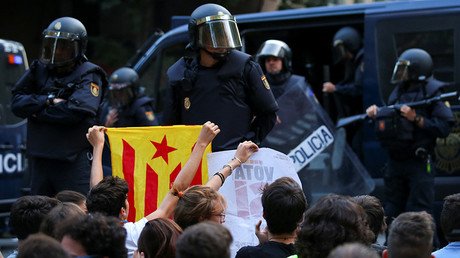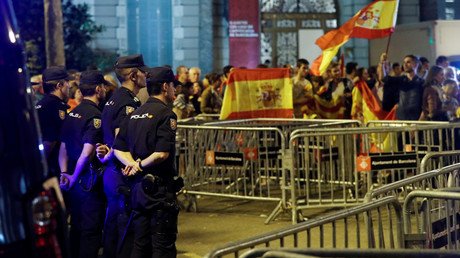Spanish govt official in Catalonia apologizes for independence vote violence
A Madrid representative in Catalonia has for the first time apologized for the police violence during the recent independence vote in the Spanish region.
"When I see these images, and more so when I know people have been hit, pushed and even one person who hospitalised, I can't help but regret it and apologise on behalf of the officers that intervened," Spanish government's official representative in Catalonia, Enric Millo, said in a television interview as quoted by Reuters.
It marks the first time a Spanish official has acknowledged and apologized for the violence which took place on Sunday, where riot police were deployed to Catalonia in an attempt to break up the independence vote. Close to 900 people were injured as police used batons and rubber bullets against those trying to cast their ballots.
However, Millo also placed the blame on the Catalan president, Carles Puigdemont, for encouraging people to go out and vote when both the government and the constitutional court considered the independence referendum illegal.
Previously, the federal government justified the actions of the police, saying they “complied with the orders of justice” and “acted with professionalism and in a proportionate way.”
The officers used force to drag people out of makeshift voting booths and seize ballot boxes, leading to confrontations and standoffs with crowds of pro-independence demonstrators. In several instances, local firefighters formed human shields to try and shield people from the riot police, but were themselves beaten.
Footage of the violent scenes quickly spread on social media, provoking outcry and condemnation. Thousands of people took to the streets of Barcelona and other cities to protest against what they call oppression and police brutality.
“After what happened on October 1 we lost patience, we can’t bear to be beaten and our elderly people and our children to be treated badly,” a woman told RT’s Anastasia Churkina.
“We don’t want security forces here. They are doing everything to bring up oppression. We saw how they behaved on October 1,” said another. “We don’t want the Civil Guard or National Police.”
However there were also some counter-demonstrations by those who supported the use of force.
“Police violence?” one man asked. “They did what they had to [in order] to restore law and order.”
The EU, however, was seemingly slow to react to the violence. On Wednesday, European Commission First Vice President Frans Timmermans appeared to justify the actions of the Spanish police, saying governments have a duty to “uphold the rule of law” which sometimes “requires proportionate use of force.”
Despite criticism from human rights groups and international media, Madrid is not backing down from taking action against what it considers illegal separatism. The Ministry of Defense has been sending in truckloads of aid and logistic assistance to the Civil Guard and National Police deployed in Catalonia, in what many Catalans consider to be a de-facto militarization of the problem.














